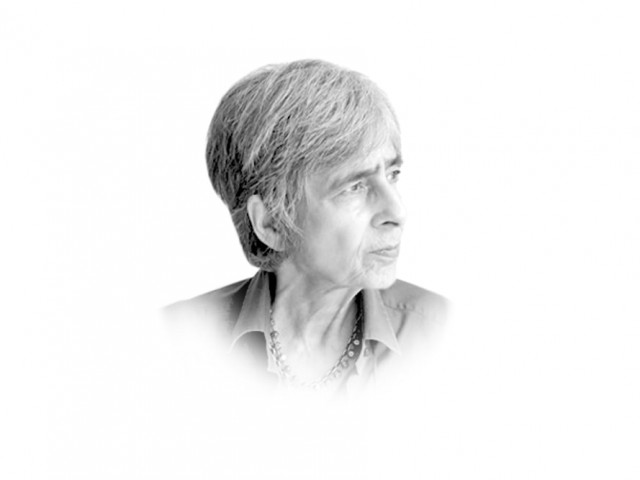On the low road
The trio that now controls the nation, are selling — not its soul, its future as an integral entity of this century.

amina.jilani@tribune.com.pk
Nawaz Sharif’s perspective on democracy swivels around the dollar and the stock market, two rather dicey, mysteriously manipulated factors that according to him, have aided the world in recognising that “Pakistan is firmly entrenched on the course to democracy”. At least, he sensibly admits to be “on the course”, the problem being staying the course.
Supposedly, according to the largely un-interpretable and ignored Constitution, the form of democracy is parliamentary. But that is not how it works. For five years, after the 2008 elections and the unsurprising result, the country and parliament were ruled from the splendours of the presidential palace by a political party chief — democracy’s prime ministers and other dummy political appointees faithfully toed the presidential line, wise monkeys all of them. The main and much-lauded achievement of the party leader was that he actually lasted out for the full five-year term.
Then suddenly, come the next round of constitutionally mandated elections, following the traditions set in the 1990s, in comes the PPP rival, the PML-N whose chief moves all powers out of the presidency and into the prime ministerial mansion. An obscure party-man, unknown to almost everyone, but who has the happy knack of knowing which edibles are most appreciated by those who matter, is installed in the presidency from whence, from time to time, statements to no avail are issued — the rulers of the day are working devotedly and honestly, the $1.5 billion is a manifestation of the “love and affection” of the donor “brother and true friend”. But then he has probably never heard of Chanakya: “There is no friendship without self interests. This is a bitter truth.”
The powerful prime minister may waffle on about democracy, the world being his oyster, but he has neither the time nor inclination for parliament. It is irrelevant, the “people’s representatives”, who represent the people in no way, are but phantoms of parliamentary democracy. The prime minister has handed over the day-to-day running of the country to two men, one connected faithfully to his family for donkey’s years, the financial conjurer, the other a political companion, also for more years than should be remembered, with a remarkable consistency as far as coiffure is concerned and a tendency towards tediousness in many other matters.
Parliament, most of the time, is unaware of how things happen. It had no clue about the whys and wherefores of the largesse gifted by “brother and true friend”, it is puzzled about the transient mighty rupee versus the might of the dollar, and it is in the dark about the never-ending controversial “talks” masterminded by the superb jack of all trades, the IntMin. The political charade of jaw-jawing with an adversary of irreconcilable aims and beliefs (to the sane, but maybe not to the many in the closet, and the great aspiring to further greatness) defies rationality. But then, in the game of political self-preservation where stands rationality?
The prime minister’s concern is with the world, which he trots around, grim-faced, making persuasive noises to all that Pakistan, forgetting the horrors and danger that lurk beneath, is flourishing, wallowing in democracy. That’s for the Western democratic lot. On another tack, he and his financial conjurer are busy, in the words of a headline of an editorial, “Leasing out Pakistan.” So the trio that now seemingly controls the nation, with an unusual silence and hands-off stance of the true might of the land, are selling — not its soul, that went long ago — its future as an integral entity of this century.
Published in The Express Tribune, March 29th, 2014.
Like Opinion & Editorial on Facebook, follow @ETOpEd on Twitter to receive all updates on all our daily pieces.















COMMENTS
Comments are moderated and generally will be posted if they are on-topic and not abusive.
For more information, please see our Comments FAQ